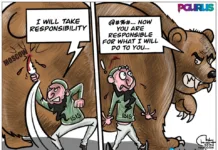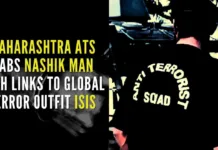
M D Nalapat
[dropcap color=”#008040″ boxed=”yes” boxed_radius=”8px” class=”” id=””]T[/dropcap]he very analysts and commentators who initially downplayed the significance of Daesh (ISIS) and underestimated its capacities are now nearly unanimous in claiming that this month’s terror attacks in Paris were not a sign of strength but of weakness. That Daesh was getting “desperate”, and that therefore, a corner had been turned. Indeed it has, but in a direction the reverse of what these optimists believe. The Paris attacks have shown that Daesh has mutated two years faster than at the least this columnist believed them to be capable, for it had been judged that attacks of the ferocity witnessed in Paris would become feasible only by 2017. The attacks indicate that Daesh has reached the stage of internal self-sufficiency within key countries in Europe which — because of the structure of the EU -effectively means the whole of the continent, except those parts ruled or significantly influenced by Moscow, such as Belarus.
…a missile-based anti-aircraft system had been made over to Daesh volunteers by the military of a NATO power…
Daesh may now be assumed to have an operationally viable “underground” segment, which in actual terms means an “overground” network of sympathisers and facilitators, most of whom must be taking care to camouflage their affiliation by the adoption of “secular” lifestyles. It would be hilarious, if it were not so horrible, to witness French authorities speak of a 23-year old as the “mastermind” of the Paris attacks. Clearly, there are resident in Paris, perhaps as businesspersons, possibly even in some instances as diplomats, individuals who are by their “open” status paradoxically less subject to surveillance than the “underground” elements, and who consequently form the higher links of the human “carrier pigeon chain” used by Deash High Command to convey its orders regarding operations. Each afflicted country in Europe by now has its own command structure, all of whose members are “open”, and each of whom would in public be spitting abuse at Abubakr al Baghdadi and mouthing the mantras of moderation. Each has a tool kit to carry out operations and a catalogue of possible targets and methods, with the local units being given the right to choose from among the options cleared from the Daesh headquarters, which by now must be mobile in view of the air strikes that have finally been intensified by NATO against Raqqa.
In these columns, it had been mentioned that information had been given that a missile-based anti-aircraft system had been made over to Daesh volunteers by the military of a NATO power and that this had been used against the Metrojet flight over Sinai. Also, that an onboard bomb would be identified as the source of the disaster, so as to draw attention away from the breach of security and the penetration of some militaries and the civilian establishment by “open” Daesh sympathisers and facilitators that resulted in an advanced missile system getting into the hands of terrorists. Sure enough, this excuse was used, with the terror organisation coming up with an amusing story about a bomb hidden inside a can of beer, so as to inform their cadres that such release of information was only a ruse. It is because NATO does not thus far appear to have concerned itself with the provenance of the cash and weapons used by Daesh and sought to bring to account those in high public office responsible for the flow that Stage 3 has been crossed.
[dropcap color=”#008040″ boxed=”yes” boxed_radius=”8px” class=”” id=””]T[/dropcap]he final point of decision for policymakers within NATO in their operations concerning Daesh, for the GCC rulers will accept the view taken by the alliance which protects them, and hence cannot be held responsible for the final decisions taken on strategy and methods. NATO needs to look at the global canvas rather than at the much narrower canvas of the Middle East in determining its strategy, for by now it is clear that the countries of the Middle East have, most of them, very little luck in finding out which policies help them and which hurt them, with the result that in pursuit of the first objective, often it is the second that results.
For reasons to do with public opinion, it may be necessary for NATO to draw attention away from their own policy failures and place the blame for Daesh on Nury al Maliki and Bashar Assad (the way the resurgence of the Taliban has been laid at the door of Hamid Karzai), but to work out policy options on the basis of such flawed reasoning could result in drastic geopolitical changes (including the enforcement of quarantine mechanisms) to reverse progression of what is in effect a disease of the international security ecosystem.
Seeking to get Moscow to discredit itself in the region by abandoning Bashar Assad is a recipe for defeat on the battlefield. The Assad regime is an incompetent and family-based dictatorship and the people of Syria deserve better, but the reality is that it is not an anti-Sunni government. Neither was alMaliki’s, except that he refused to accept the Sunni overlordship that was a feature of Saddamite Iraq. “Justice” to the Sunnis does not mean consigning the Shia to the same inferior position that they hold in countries such as Bahrain. The Transitional Government urged on by Clinton’s successor John Kerry would — on present form — include elements of the “open” Daesh network, which would seek to subvert the system the way Talibal sympathisers in Kabul facilitated and protected that group of insurgents in Afghanistan, especially from 2005 onwards, when NATO marginalized the Northern Alliance in its zeal to “do justice” to the Pashtuns, the same impulse that brought Ashraf Ghani to power.
Will Daesh go in for more terror strikes across Europe, now that its capacity enables such operations, or will it go in for a period of outward inactivity and inner consolidation on the LTTE model in Sri Lanka? The weeks ahead will tell. Whatever, the reality is that the failure to turn back Daesh at the Rhineland and at Czechoslovakia is leading towards Danzig and a prolonged global conflict with a deadly force expert at using its own enemies to become its enablers.
[This article, written by M D Nalapat, was originally published in the “Pakistan Observer” on 20 Nov 2015]
- Prime Minister Narendra Modi: A Gujju businessman who does not invest his precious time for a losing battle - April 13, 2024
- NIA arrests two accused Shazib and Taahaa in Bengaluru’s Rameshwaram Cafe blast case from Kolkata - April 12, 2024
- National Herald scam: Adjudicating Authority upholds Rs.752 crore assets attached by ED - April 11, 2024










